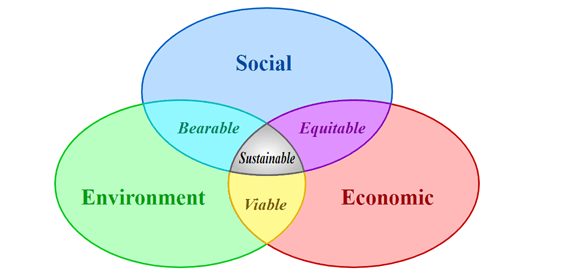
Dear Readers, I don’t know about you but I get a bit fed up with the way that the term ‘sustainability’ is banded about these days. Everyone from Big Pharma to the manufacturers of concrete talk endlessly about how their products are ‘sustainable’ without seemingly giving any thought to what this actually means. Much as ‘natural’ and ‘green’ are terms totally without any actual legal meaning, so we have a general sense that something that is ‘sustainable’ must be a good thing. No wonder many of us are so tired and cynical about the ‘greenwash’ that is everywhere, and no wonder we are also very confused.
Let’s take a quick whizz back to 1987 and a meeting of the World Commission on Environment and Development, also known as the Brundtland Commission after the chair, the Norwegian Prime Minister Gro Harlem Bruntland. The aim of the Commission was to attempt to define ‘sustainable development’. In the process, they had to try to square the circle between developed countries, who were trying to protect the environment while also protecting their burgeoning economies and the lifestyles of their electorates, with the needs of developing countries who wanted better lives for their people. The formulation arrived at was:
‘Sustainable development is development that meets the needs of the present without compromising the ability of future generations to meet their own needs‘.
Well, it was nice that everyone could agree with this (very flexible) statement, but in effect it enabled everyone to kick the ball of what it actually meant into the long grass for a generation.
What sustainable development actually means is contained in the Venn diagram at the top of the page. It has to factor in three areas: the economy, the people affected by it, and the environment. You only have to look at the diagram to sense the enormity of the issue. Sustainable development can only happen when the environment is able to bear what is happening (after all, sustainable in effect means that things are in a steady state, not deteriorating). It must be economically viable. And thirdly, it must be equitable.
What a tremendous aspiration this is! And you only have to think about it for five minutes to spot the problems. Who decides what the environment can bear? It’s clear that the planet is currently overwhelmed with a whole range of problems, but for much of the population it’s business as usual. Equity between people is a vanishingly rare phenomenon in human history, even though studies show that the most equitable societies have more happy people (not just the poorest but also the richest). And who decides what is ‘economically viable’?
Well, let’s hope that at some point we’re able to work it out, preferably before the whole place becomes uninhabitable for humans. There are some truly wonderful projects happening out in the world: my text book mentions a non-governmental organisation called Shidhulai that works in Bangladesh. They have boats equipped with solar panels that move about the Sunderbans, where road transport is very difficult, and they supply households with recharging facilities for household electricity needs, as well as a floating school and healthcare facilities. The schools are especially important in raising levels of female literacy. The solar-charged lamps that they provide displace kerosene lamps, improve air quality and health in people’s homes and are used by night-fishermen, allowing them to earn more and work in greater safety. You can read more about this project, and many others, here. And do have a look – it’s so easy to just fall into despair these days, but the ingenuity and determination of human beings to make things better should never be underestimated.
Ah – ‘sustainability’ – another useful word made meaningless through over- and incorrect usage! The original definition was a sound ‘umbrella’ term yet, as you rightfully point out, it requires a lot of refinement in terms of actual practice on the ground. I often think of the first stanza of ‘God’s Grandeur’ by Gerard Manley Hopkins. As horrified as he was, he wrote during a time when it was easy to believe that “And for all this, nature is never spent”. No more … now we have to tread very carefully indeed!
I imagine that only a century ago we honestly believed that nature was limitless, in spite of so many examples to the contrary. I wonder when we’ll accept that enough is enough?
With the rise of “sustainability” terms like “biodiversity” and “ecology” have gone into decline (in English usage). To me it represents commercial interests muscling into the equation and dominating environmental decision making processes, big and small.
So true, Mal – so much greenwash, so little action, at least from the big corporates.
Sustainable development changes with time. A good post…
Thank you!